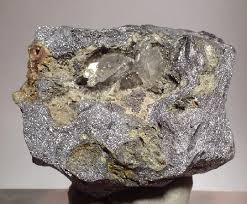记忆方法
记忆“ore”这个单词可以通过联想其与“more”的关系来简化。想象“ore”是“more”的一个缩写,即“more”的“o”和“r”组合在一起,形成一个矿石(ore)的意象,因为矿石是含有金属等宝贵物质的东西,就像“more”的量多一样。通过这样的联想,可以更容易地记住“ore”代表矿石的意思。
以上内容由AI生成, 仅供参考和借鉴
中文词源
ore 矿石,矿砂
来自古英语ora,矿石,矿土,未冶炼金属,词源同earth.同时受另一个古英语词ar影响,黄铜,铜矿,来自PIE*aus,金黄色的,词源同aurora,ormolu.
英语词源
- ore
-
ore: see era
- ore (n.)
- 12c., a merger of Old English ora "ore, unworked metal" (related to eorþe "earth," see earth; and cognate with Low German ur "iron-containing ore," Dutch oer, Old Norse aurr "gravel"); and Old English ar "brass, copper, bronze," from Proto-Germanic *ajiz- (cognates: Old Norse eir "brass, copper," German ehern "brazen," Gothic aiz "bronze"), from PIE root *aus- (2) "gold" (see aureate). The two words were not fully assimilated till 17c.; what emerged has the form of ar but the meaning of ora.
权威例句
- 1. We dowse oil and ore in South America for big companies.
- 我们在南美洲为一些大公司探测石油和矿石。
- 2. They struck a rich seam of iron ore.
- 他们开出一个富铁矿层。
- 3. How many tons of ore can this machine crush in an hour?
- 这机器每小时可以破碎多少吨矿石?
- 4. The net profit amounts to 20 dollars per ton of ore.
- 每吨矿砂的净利达20美元.
- 5. They refined gold out of the ore.
- 他们从矿石中提炼出黄金.
